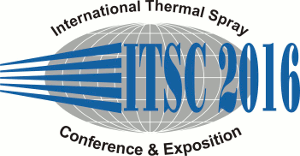
|
4844 |
|
Tuesday, May 10, 2016, Auditorium 12:10 PM Cold Gas Spraying I |
|
High deposition efficacy additive manufacturing of titanium using nitrogen cold spray |
|
Daniel MacDonald* / University of Ottawa, Canada Rubén Fernández/ University of Ottawa, Canada Bertrand Jodoin/ University of Ottawa, C |
|
Titanium parts are ideally suited for aerospace applications due to their unique combination of high specific strength and excellent general corrosion resistance. However, the raw materials are expensive and difficult to machine. Large mass production of complex titanium aerospace parts through additive manufacturing looks promising but there are still questions that need to be answered such as the reliability and robustness of the various additive manufacturing processes as well as proper characterization/evaluation of the material properties, dimensional accuracy, surface finish and part distortion from thermal effects. The cold gas dynamic spray process offers the potential for additive manufacturing of titanium parts due to its reduced reactive environment, its simplicity to operate, and the high deposition rates it offers. This could potentially allow large parts to be produced in reduced time compared with current methods such as Selective Laser Melting which is a slow and costly process. A few challenges are to be addressed for the additive manufacturing potential of cold spray, in particular, it is known that titanium is extremely easy to deposit by cold gas dynamic spray, but the deposits produced are usually porous when nitrogen is used as the carrier gas. In this research, a method to deposit fully dense commercially pure titanium at high deposition efficiencies is revealed. The components are produced using low pressure cold spray using only nitrogen as the carrier gas. The microstructure and mechanical properties of additive manufactured titanium coupons are investigated and compared to bulk material before and after heat treatment. |